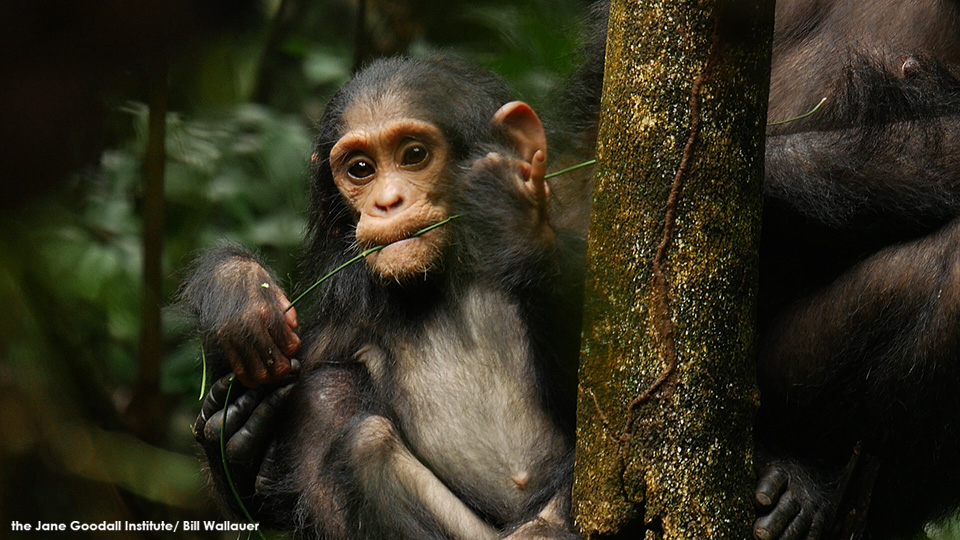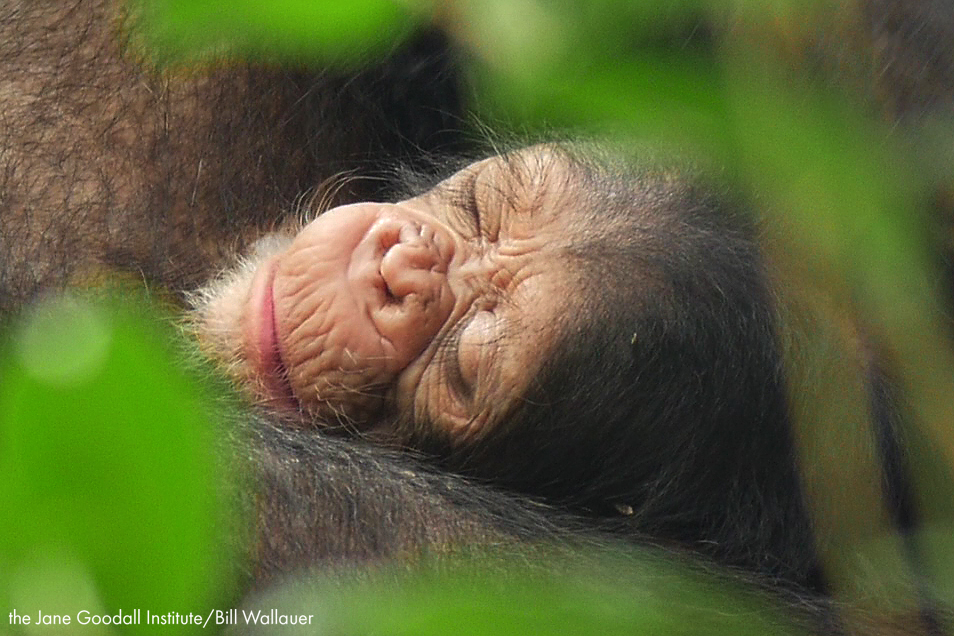You’re in a forest in the Congo Basin of Africa, but where are all the chimps? Did you know that chimpanzees oftentimes will reroute their foraging excursions to avoid contact with humans? These intelligent primates never cease to amaze us at the Jane Goodall Institute, and we’re learning more about them every day. Here’s a wrap-up of the most recent findings about our jungle-dwelling friends:
Genetic opposites attract when chimpanzees choose a mate
Chimpanzees have proven their incredible instincts and dazzling intelligence once again with the breakthrough observation that when it comes time to reproduce, chimpanzees opt for a mate with the genetic code most different from their own. In large family trees, chimpanzees are capable of identifying a chimp of the opposite sex with the most distant DNA. The study explains, “Chimps are somehow able to distinguish degrees of genetic similarity among unfamiliar mates many steps removed from them in their family tree.” Although scientists haven’t determined how, Anne Pusey, professor of evolutionary anthropology at Duke (and student of Dr. Jane Goodall, learn more about her work with JGI here), suspects that it may be because of smell, sound, or appearance. Learn more about our research, over 56 years of continuous chimpanzee observation and more, here.
 Wild chimpanzees have surprisingly long life spans
Wild chimpanzees have surprisingly long life spans
A 20-year demographic study at Uganda’s Kibale National Park has confirmed that chimpanzees in the wild have an impressively long life span. Due to favorable food sources and ecological factors, the 306 chimpanzees studied in Uganda had an average life expectancy of 33 years. The collected data “also inform the study of the evolution of human life history, helping us to imagine the conditions that could have changed mortality rates among our early hominin populations,” explained Brian Wood, the lead author of the study and assistant professor of anthropology at Yale.
In the same national park, not far from Ngogo, other researchers have studied the life expectancy of chimpanzees in the Kanyawara community. Like Ngogo, this community lacks natural predators, but its life expectancy at birth is nearly 13 years shorter than that of Ngogo. The Ngogo chimpanzees’ higher survivorship appears to be an adaptive response to a more abundant and less varied food supply than that of Kanyawara, the researchers argue.
“It has long been proposed that there are extreme differences in the life expectancies of human hunter-gatherers and chimpanzees,” said David Watts, professor of anthropology at Yale and a co-author of the study. “Our study finds that while maximum lifespan differs a great deal, the differences in average lifespan are not as dramatic as typically thought, especially when chimpanzees are not subjected to major negative impacts caused by humans. In fact, the Ngogo community’s pattern of survivorship more closely resembles that of human hunter-gatherers than those documented for other chimpanzee communities.”
Learn more about chimpanzees on our wiki here.

Chimpanzees adapt their foraging behavior to avoid human contact
For over a year, scientists from the University of Kent’s School of Anthropology and Conservation (SAC) followed chimpanzees for a 4-hour period in the morning and afternoon in West Africa. They observed that the chimpanzees preferred a mature forest landscape, showing their awareness of humans by staying at least 200 meters from cultivated land. This information will be crucial in examination how chimpanzees are impacted by human agriculture and development. For this reason, the Jane Goodall Institute focuses on retaining primary forests, not only to protect the chimps, but to bolster the entire ecosystem that relies on a healthy environment. Learn more about the Jane Goodall Institute’s Healthy Habitats initiative here.
With every study and piece of data collected, scientists learn and share more about our chimpanzee friends. As animal-lovers, we are constantly in awe of how stunningly sophisticated and special this species is, from their ability to detect genetic code to their adaptation of foraging behaviors. The more we know about the chimpanzees, the more it allows us to learn more about ourselves and what actions we can take to protect chimps, their habitats and other species we share this planet with.

The Jane Goodall Institute is a global community conservation organization that advances the vision and work of Dr. Jane Goodall. By protecting chimpanzees and inspiring people to conserve the natural world we all share, we improve the lives of people, animals and the environment. Everything is connected—everyone can make a difference.







